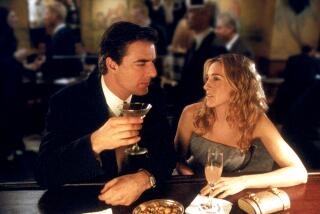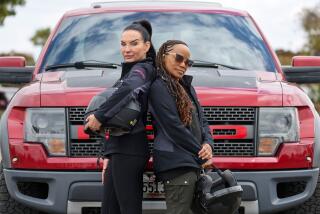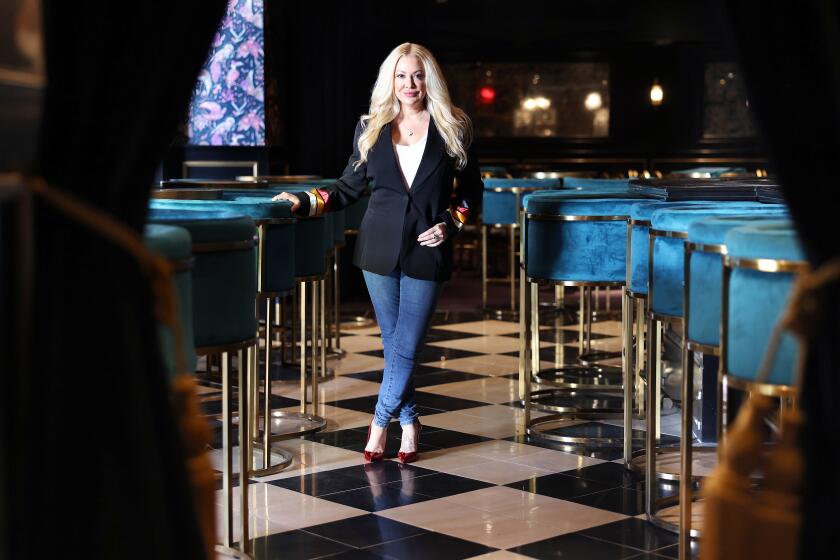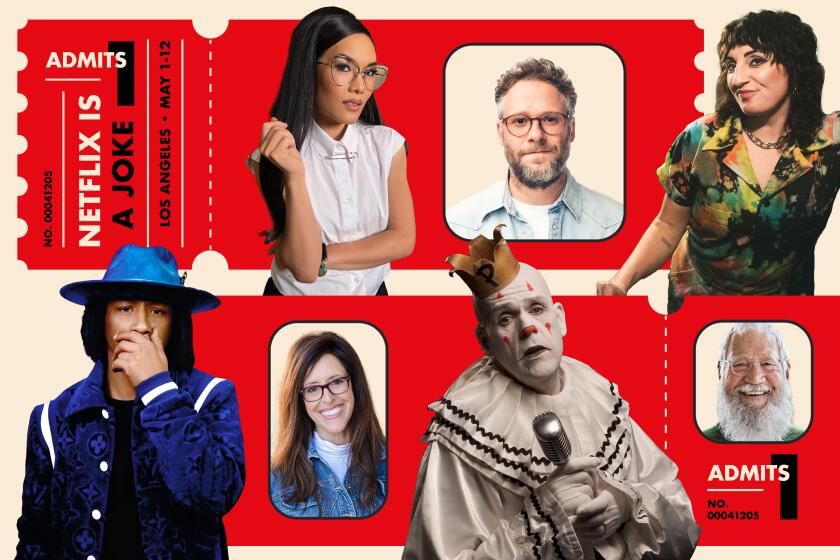Shauna Robertson is just one of the guys
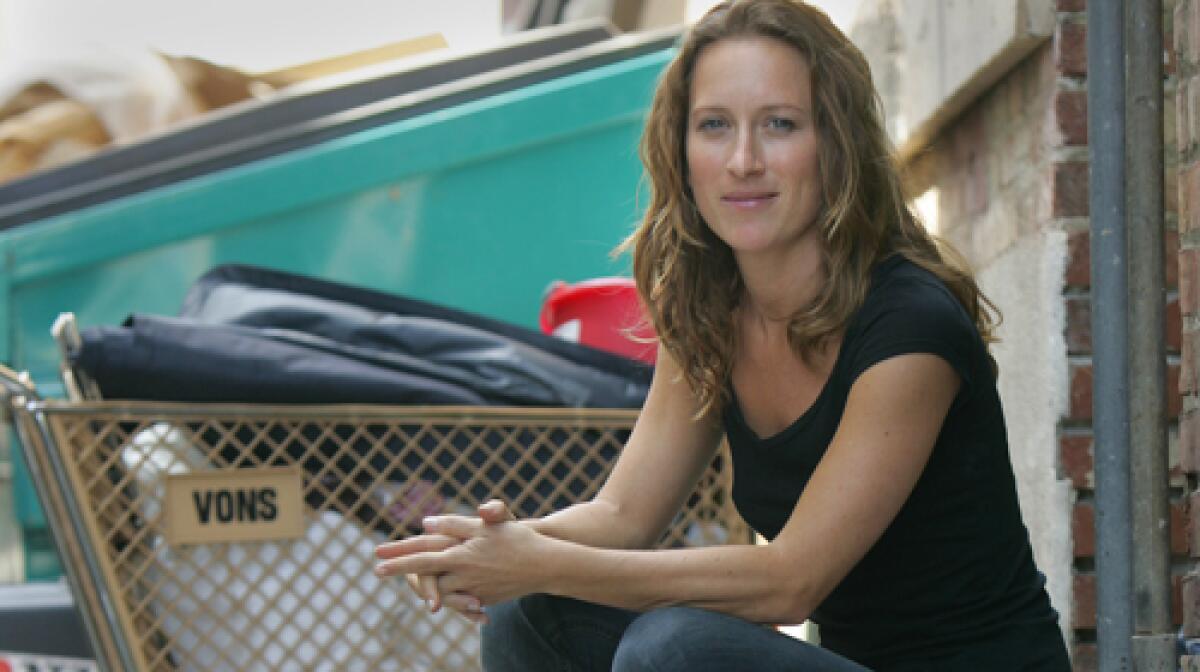
IN HER mind, Shauna Robertson is a 23-year-old guy, always ready with a fart joke, an ever-ready plea for more nudity, and a belly laugh for any raunchy gag.
In reality, she’s a pretty, 33-year-old, pixie-sized, blond Canadian high school dropout with a producing résumé that would make a studio executive’s mouth water. That would include “Elf,” “Anchorman,” “The 40-Year-Old Virgin,” “Knocked Up,” “Superbad” and “ Forgetting Sarah Marshall.”
I first met Shauna Robertson last summer in Torrance on the set of her new movie, the stoner buddy comedy “ Pineapple Express,” which hits theaters today. Frankly, I didn’t know there were any women in Judd Apatow’s comedy mafia other than Apatow’s wife, Leslie Mann. On-screen, it’s a guy-centric world, often devoted to male sexual anxiety and ribald language (albeit with a frequently sweet, almost feminine undercurrent).
Furthermore, the employment stats for women in all aspects of the film business has actually gotten worse in the last decade, according to Martha Lauzen, a professor at San Diego State who tracks this stuff. In 2007, only 22% of the top 250 domestic-grossing movies employed a female producer, and Robertson produced two of them.
On the day I met her, the team was filming the sequence in which process server Dale ( Seth Rogen) and his drug-dealer-turned-best friend, Saul ( James Franco), escape from a hydroponics pot-growing warehouse, and the atmosphere was festive, like a groovy bunch of kids somewhat amazed that the grown-ups had shelled out millions of dollars for their use. In the middle of it all was a tiny, adorable woman, who looked about 12. She buzzed with the high energy of the super-efficient without any of the irritating officiousness or bossiness that occasionally accompanies movie-biz competence. I remember her watching her surroundings as if her antennae were permanently up.
I now understand that what she was doing was producing, as she defines the job. “I think one of a producer’s greatest talents is to be able to listen to a bunch of conversations going on at once -- the grips and electricians talking to one another, the talent talking to the director over my shoulder. Everyone’s problems become my problem, so I can figure them out before they become each others’ problems,” she said at the time.
I’ve always found it hard to know what a producer actually does, because almost anybody can hang up a shingle and declare himself or herself a producer. Clearly a business card does not automatically a new Jerry Bruckheimer make. These days, there seem to be a lot of trustafarians or investment-banker types with wads of cash floating around sets. Others are simply people who happen to know a writer and end up attached to a project. And then there are those producers who’ve worked their way from the ground up, who actually do know about script improvement or set management, or studio jujitsu. And a few (Bruckheimer, Scott Rudin, Brian Grazer) are tastemakers in their own right.
Robertson is clearly in the mold of being a director’s best friend, shrink, advocate, personal logician and defender of the vision from budgetary constraints.
I recently had lunch with Robertson at Real Food Daily, a health food restaurant in Santa Monica. She brought along “Pineapple Express” director David Gordon Green. While she’s hardly shy, she seems vaguely embarrassed that anyone would want to hear her “blather on” about herself. The previous night was “Pineapple’s” Los Angeles premiere, which ended with an after-party with 200 of Rogen and co-writer Evan Goldberg’s closest friends, in a “purple haze,” Robertson says with a laugh. “I saw the people there unscrewing the smoke detectors.”
Green has a Southern accent and an earnest manner, as befits the maker of “George Washington” and other micro-budgeted coming-of-age tales set in Southern mill towns. Those are the kinds of films he was doing before Judd Apatow and Robertson enticed him into their camp, via mutual friend actor Danny McBride, whose film “Foot Fist Way,” was a comedy mafia favorite.
Green says Robertson calms anxiety rather than revs it up. “There are tremendous curveballs thrown at you during filming. She lets you know when you’re hearing something you don’t want to hear, that it’s going to be OK. It’s like a warm hand on the shoulder that soothes rather than amplifies the conflict.”
“Shauna is obsessed with getting every detail correct,” says Apatow via e-mail. Robertson has produced all of Apatow’s directorial efforts and co-produced with Apatow several films by his young protégés, like “Pineapple.”
Apatow says that she fits right in with his crowd’s aesthetics. “She is the rare woman who always wants to take the joke farther than any man wants to go. All nudity in my films is a result of Shauna pushing me and calling me a wimp. If it wasn’t for her I would be making ‘Bratz 2.’ ”
Robertson admits that most of her friends -- but not all -- have been guys.
There have certainly been those critics who’ve found the raucous, juvenile world of Apatow and his merry band of misfits, well, misogynistic, like Katherine Heigl, the star of “Knocked Up,” who told Vanity Fair that her career-making film was “a little sexist. It paints the women as shrews, as humorless and uptight, and it paints the men as lovable, goofy, fun-loving guys.”
Robertson won’t engage in any public saber rattling, except to say diplomatically, “I don’t share that opinion. I feel like we have very strong women in our movies.” “Knocked Up” certainly drew big female crowds, according to Universal, its distributor. Many of Apatow’s films feature an immature Don Quixote’s quest for his inevitably saner, and brighter Dulcinea, though “Pineapple Express” is actually a full-on bromance. “But that’s its point,” says Robertson. “Hanging out with female characters wasn’t a priority.”
Robertson says her biggest preparation for producing was to have hippy parents. “It’s good early training to have an incredibly irresponsible family. It forces a young person to take responsibility, to be organized,” she explains.
She grew up on a farm outside of Toronto. Her father teaches hang gliding, and her mother is a yoga instructor. “My mother called me the benevolent dictator because I liked things done in an efficient way,” Robertson says. Her mother loved movies, and every Tuesday took her out of school for movie matinees.
At 16, she quit high school to move to Los Angeles to work as an assistant to writer-director Mike Binder, whom she knew because she, and he, and her mother had all attended the same camp in Canada, the one he memorialized in his film “Indian Summer.” She went on to work for actor-turned-director Hart Bochner (“PCU”), Jay Roach (“Meet the Parents”) and ultimately helped Adam McKay and Will Ferrell get “Anchorman” going. She’s a little fuzzy on how she actually met Apatow, except she met a lot of people through the mega-comedy manager Jimmy Miller and she hung out a lot at comedy clubs, at first simply because she was too young to get into bars.
Robertson appears relatively ego-free about what she does except to say that it’s essentially an extension of how she started out, as a director’s assistant. The title has changed; the function has not. “I always do the same job. I don’t always remember what the credit is.”
More to Read
The biggest entertainment stories
Get our big stories about Hollywood, film, television, music, arts, culture and more right in your inbox as soon as they publish.
You may occasionally receive promotional content from the Los Angeles Times.

